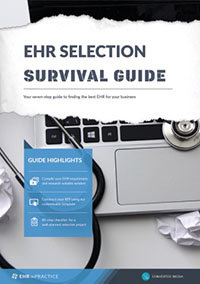Can a modern practice survive without an EHR
According to The Office of the National Coordinator for Health Information Technology, more than 95 percent of hospitals and nearly 90 percent of office-based physicians have adopted an electronic health record (EHR) system. With high adoption rates at 90% or higher across the healthcare industry, EHR use can be accurately described as standard practice. However, the question is often raised as to whether a healthcare provider can practice without EHR?
The short answer to this question is no. From the perspective of compliance with state and federal regulations and from the perspective of health care best practices operating without some form of modern EHR is not advisable. Further, as will be discussed below, practices that bill through Medicaid or Medicare are required to have an EHR in place in order to avoid reductions in their rate of reimbursement.
Is EHR beneficial to the medical practice?
Healthcare providers and organizations of all sizes benefit from EHR use in tangible ways. The potential benefits of EHRs include improved clinical outcomes, greater efficiency found in reducing waste and providing care in a more efficient, cost-effective manner. However, a healthcare practice that adopts an EHR is not guaranteed that they will realize these benefits by just adopting an EHR. Rather, an EHR must be deployed in a way that allows for the best opportunity to achieve these benefits. For example, the appropriate system must be selected in order to maximize EHR-related benefits and staff must be trained to make the most out of the features on the EHR.
Can practices be compliant without EHR?
When answering the question of whether a practice can be compliant with state and federal regulations without using an EHR depends on the type of practice and the patient population the practice serves. A practice that offers healthcare services to the public should have an EHR in place. However, as a rule, it is not prerequisite to offer healthcare services to the public. However, one should be aware of not having an EHR in place can severely limit the types of services that can be offered and the types of patients that can be seen. For example, certain prescriptions such as those listed as a controlled substance must be sent electronically through a secure EHR system. Further providers who serve patient that are covered by Medicare and Medicaid must use a certified EHR and be able to attest to certain meaningful use components.
A healthcare practice that aspires to remain in the marketplace over the long term should adopt an EHR. The reasons that underly this rest on the fact that, from an administrative perspective, an EHR is required to effectively offer quality clinical services in an efficient manner. Further, in order to manage a practice and bill for services in an effective manner, an EHR is necessary from a financial viability standpoint albeit not one that is required by state or federal regulations.
Therefore, when answering the question presented above regarding whether an EHR is required from the standpoint of best practices a healthcare practice operating in the current environment is a yes; it is well advised to have an EHR.
Free white paper

Top 20 EHR Comparison
Compare the top EHR systems on offer in our comparison guide

Featured white papers
Related articles
-

5 key stakeholders in your EHR selection
Learn about the individuals that, when consulted early and often, can make your EHR selection pro...
-

Disadvantages of EHR systems - dispelling your fears
The disadvantages of EHR, and how to overcome them
-

5 important areas of EHR training during implementation
Successful EHR implementation is not possible without crucial EHR training




